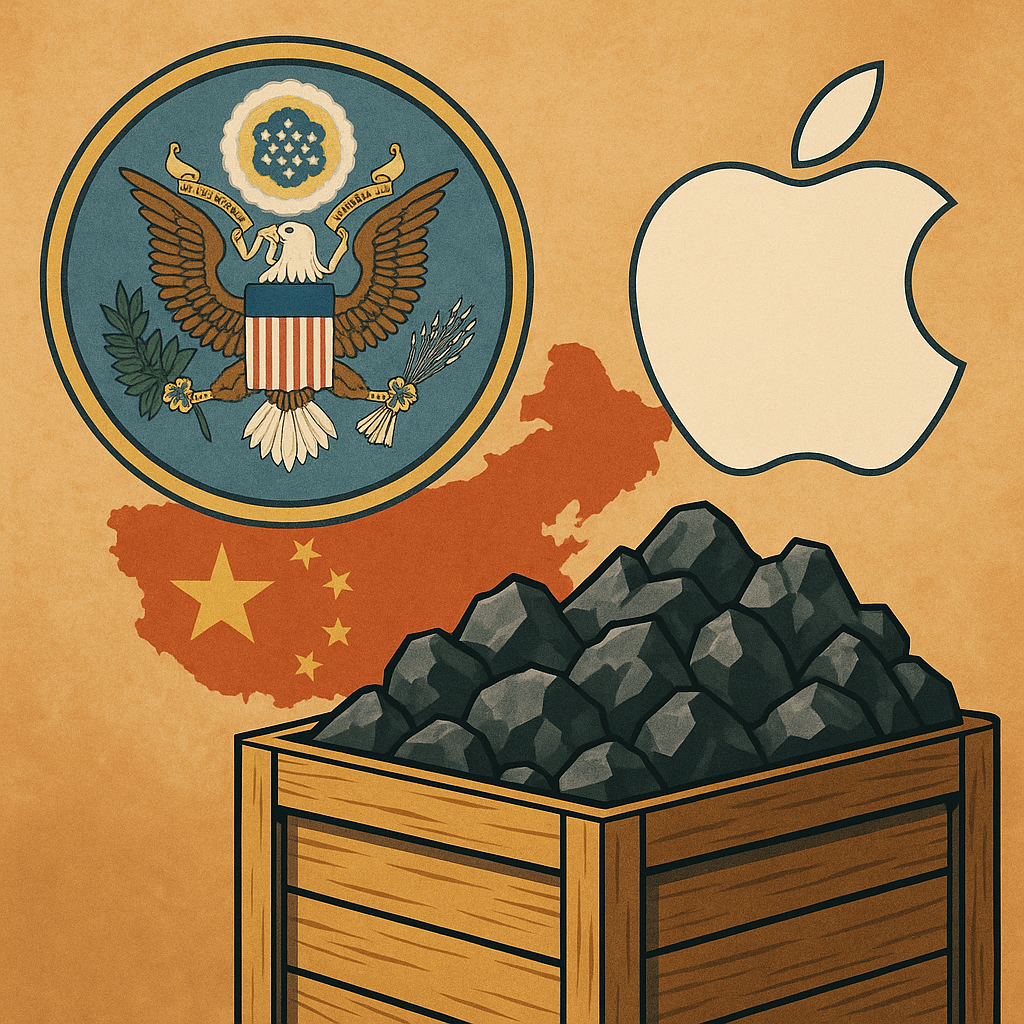A Rare Earth Power Play: U.S. Bets Big on Domestic Supply Chain Amid China Tensions
The race to secure critical minerals just got a seismic jolt—Washington and Silicon Valley have both placed major bets on MP Materials, the rare-earth miner headquartered in Mountain Pass, California. In a strategic two-pronged move, the U.S. Department of Defense (DoD) has become MP’s largest shareholder, while Apple has committed a $500 million investment to help accelerate the company’s downstream manufacturing capacity.
For investors watching the global shift in supply chain resilience and resource independence, this signals more than just a boost for a single company. It marks the deepening alignment of geopolitical priorities and private capital in reshaping the rare-earth sector—an industry long dominated by China.
Washington’s Strategic Stake: DoD Becomes Top Shareholder
The Pentagon’s newly disclosed stake—part of a defense industrial base initiative—represents a major shift in U.S. resource policy. According to Reuters-backed summaries and Defense Department procurement documents, the government’s equity position in MP Materials is part of a $450 million package aimed at fast-tracking domestic processing of rare-earth oxides, which are essential for weapons systems, satellites, electric vehicles, and wind turbines.
This move follows repeated concerns from U.S. policymakers about overreliance on China, which currently controls over 85% of global rare-earth refining capacity, despite the U.S. possessing significant untapped reserves.
“MP’s strategic importance now extends beyond the market,” noted Jonathan Evans, a senior defense industry analyst at the Center for Strategic and International Studies (CSIS). “This is not just an investment—it’s part of national security infrastructure.”
Apple Enters the Chat: Silicon Valley Backs Critical Minerals
Just as notable is Apple’s $500 million infusion—structured through a long-term offtake agreement and capital expenditure partnership. The tech giant has increasingly sought to control more of its upstream supply chain, particularly in securing materials for its growing EV and battery initiatives.
Apple’s move underscores how tech companies are no longer just buyers of raw materials—they’re becoming stakeholders in the ecosystems that produce them. The partnership includes plans to help MP Materials build a full-stack processing and magnet-making facility in Texas, bringing rare-earth component manufacturing back to the U.S. for the first time in decades.
This vertical integration could create lasting advantages for both companies: for MP, a guaranteed customer and R&D partner; for Apple, supply security and ESG alignment.
Why This Matters for Investors
This dual endorsement from the Pentagon and Apple is a major validation for MP Materials—and more broadly, the U.S. rare-earth value chain.
Key implications:
- Market Positioning: MP is now arguably the most strategically positioned rare-earth company in North America. With upstream mining at Mountain Pass and downstream magnet-making on the way, it could emerge as a rare vertically integrated U.S. supplier.
- Policy Tailwinds: The investment aligns with the Biden and Trump administrations’ bipartisan push to decouple critical mineral supply chains from China. Expect continued funding from the CHIPS and Science Act, Inflation Reduction Act, and future national defense budgets.
- ESG & Tech Synergy: Investors focused on clean energy, EVs, and tech infrastructure should view rare-earths as a foundational resource class—much like lithium and copper.
Future Trends to Watch
- Rare-Earth ETFs & Mining Stocks: Funds like the VanEck Rare Earth/Strategic Metals ETF (REMX) may see increased interest as exposure to MP and peers becomes a proxy for U.S. strategic investment trends.
- New Entrants & M&A: With MP setting a precedent, other players like Lynas Rare Earths (Australia) or smaller Canadian miners may become acquisition targets or beneficiaries of public-private partnerships.
- Policy Watch: Keep an eye on further DoD and DOE grants, as well as export restrictions from China that could spike prices or reorder global trade routes.
Key Investment Insight
Investors seeking exposure to energy transition metals and national security-aligned infrastructure may want to consider MP Materials as a core satellite position. While the stock has historically been volatile due to commodity pricing, the Pentagon and Apple’s backing significantly de-risk its long-term growth prospects. The broader rare-earth sector—previously niche—is rapidly becoming a geopolitical asset class.
As the world accelerates toward electrification, autonomy, and global power realignment, critical minerals like neodymium and praseodymium are the new oil. And MP Materials, now backed by both the White House and Cupertino, may be at the epicenter of this unfolding industrial revolution.
Stay ahead of the curve with daily, data-driven insights at MoneyNews.Today—your trusted source for strategic investor intelligence.





